Specialization in Generative AI & Prompt Engineering
- 4.5/5 (1500+ Student's Ratings)
Backed by leading industry experts, ScaleUp’s Post Graduate Program in Data Science & AI delivers real-world knowledge and practical experience to help you build a future-ready career in one of the world’s fastest-growing domains.



Next Cohort
This Week
Duration
8 Months . Online
06 Months
Live Internship
Eligibility
Freshers, Experienced
What You’ll Get with the ScaleUp Experience
Our Post Graduate Program in Data Science & AI is designed to give you more than just knowledge—it gives you the edge to thrive in the real world. With hands-on learning, expert guidance, and career-focused support, here’s everything that comes with the program:
- 1:1 Doubt Clearing Session
- Live Hackathons
- Lifetime Career Support
- Webinars And Workshops
- Extensive Course Materials
- 250+ Hours of Self Paced Learning
- 400+ Hours of Live classes
- Industry Expert Mentors
- 360° Placement Assistance
- 24/7 Student Support
- Personalized Learning Paths
- Regular Assessments
- Progress Tracking
- Networking Opportunities
- Flexible Learning Schedules
- Strong Alumni Network
- Interview Preparation
- Certification Programs
- Interactive Learning Platform
- Real World Projects
What You’ll Learn
This program helps you go beyond just crunching numbers—you’ll learn how to use data to make smarter decisions and solve real problems.
You’ll explore how top companies use data to drive growth, and you’ll build skills in:

Analyzing and visualizing data

Drawing clear insights from complex datasets

Making data-backed business decisions

Communicating your findings with confidence
Languages and Tools Covered












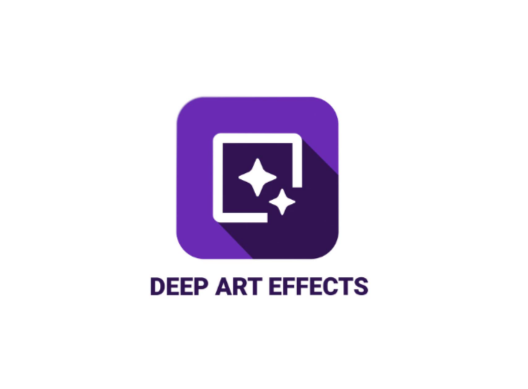



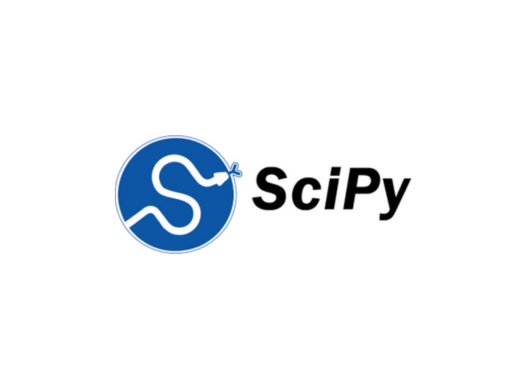


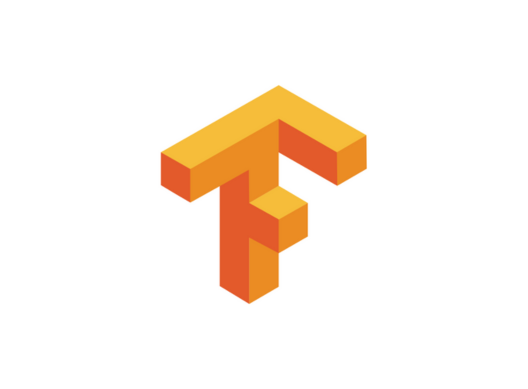
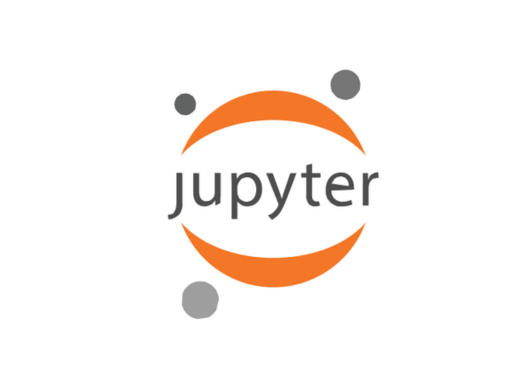







Course Curriculum
Our curriculum is designed to make you job-ready from day one. You’ll learn essential tools like Python, SQL, and Excel—skills every data professional needs. From writing clean code and automating tasks to mastering pivots, lookups, and queries, you’ll gain the confidence to handle real data challenges. We’ll also cover key statistical concepts like regression, correlation, distributions, and eigenvalues, helping you not just understand the math, but apply it to real-world problems. Every concept is tied to practical business use—so you’re not just learning, you’re preparing to perform.
- Modules
Python
- Text Preprocessing: Understand the basics of tokenization, stemming, and lemmatization.
- RNNs for Text Generation: Understand in detail RNNs, including how they generate humanlike text.
- NLP Applications: Study the language model for tasks like machine translation, sentiment analysis, and conversational AI.
Statistics
- Descriptive Statistics: Learn about mean, median, mode, standard deviation, and variance.
- Probability Distribution: Understand the concept of normal distribution, skewness, and kurtosis.
- Correlation and Regression: Develop an understanding of the relationship between variables by computing a correlation coefficient and performing linear regression.
- Hypothesis Testing: Learn how to arrive at data-driven decisions through t-tests, chi-square tests, and ANOVA.
SQL
- SQL Basics: Learn how to fetch and modify data by using statements like SELECT, WHERE, and JOIN.
- Aggregation and Functions: Learn about various aggregation functions like COUNT, SUM, AVG, and GROUP BY.
- Advanced Subqueries and Views: Dive into advanced subqueries; learn to create views that will enable you to manage data in a much better way.
- SQL for Data Science: Learn how to use SQL for Data Cleaning, Exploration, and Reporting in AI Projects.
Introduction to Generative AI
- Generative AI Overview: Learn the basics of generative models and how they differ from discriminative models.
- Applications of Generative AI: Review real-world applications including text generation, image synthesis, creative AI.
- Ethical Issues: Understand the ethical issues of AI privacy and fair data.
Small Language Model Introduction
- SLM Overview: Understand how a small language model works, especially in resource-constrained settings.
- SLM Training Methods: Hands-on practice on SLM training methods on text generation tasks, as well as other tasks revolving around languages.
- Optimization techniques: How to optimize the SLM for use in edge devices or under limited computational resources.
Basics of Machine Learning & Deep Learning-ML & DL
- SLM Overview: Understand how a small language model works, especially in resource-constrained settings.
- SLM Training Methods: Hands-on practice on SLM training methods on text generation tasks, as well as other tasks revolving around languages.
- Optimization techniques: How to optimize the SLM for use in edge devices or under limited computational resources.
Generative Adversarial Networks (GANs)
- SLM Overview: Understand how a small language model works, especially in resource-constrained settings.
- SLM Training Methods: Hands-on practice on SLM training methods on text generation tasks, as well as other tasks revolving around languages.
- Optimization techniques: How to optimize the SLM for use in edge devices or under limited computational resources.
Variational Autoencoders (VAEs)
- SLM Overview: Understand how a small language model works, especially in resource-constrained settings.
- SLM Training Methods: Hands-on practice on SLM training methods on text generation tasks, as well as other tasks revolving around languages.
- Optimization techniques: How to optimize the SLM for use in edge devices or under limited computational resources.
Natural Language Processing
- SLM Overview: Understand how a small language model works, especially in resource-constrained settings.
- SLM Training Methods: Hands-on practice on SLM training methods on text generation tasks, as well as other tasks revolving around languages.
- Optimization techniques: How to optimize the SLM for use in edge devices or under limited computational resources.
Introduction to Large Language Models
- Overview of LLMs: To understand the role that large language models such as GPT and BERT play in AI.
- Training LLMs: Understand the challenges in training LLMs, from data requirements to computational needs.
- Applications of LLMs: Learn about applications of LLMs in the areas of text generation, content creation, and natural language-related tasks.
Advanced Generative AI
- Attention Mechanisms: Understand the transformer architecture and attention mechanisms in use in modern AI.
- Reinforcement Learning: Learn how reinforcement learning is applied to generative models and game AI.
- Creative Applications of AI: Generative AI’s role in art, music, video, and storytelling.
- Soft Skills Program
- Resume Building
- Communication Skills
- Interview Preparation
- Time Management
- HR Round Guidance
- E-mail Writing
- Personality Development
- Emotional Intelligence
- Conflict Management
- Salary Negotiation
- Creativity
- Get Certification
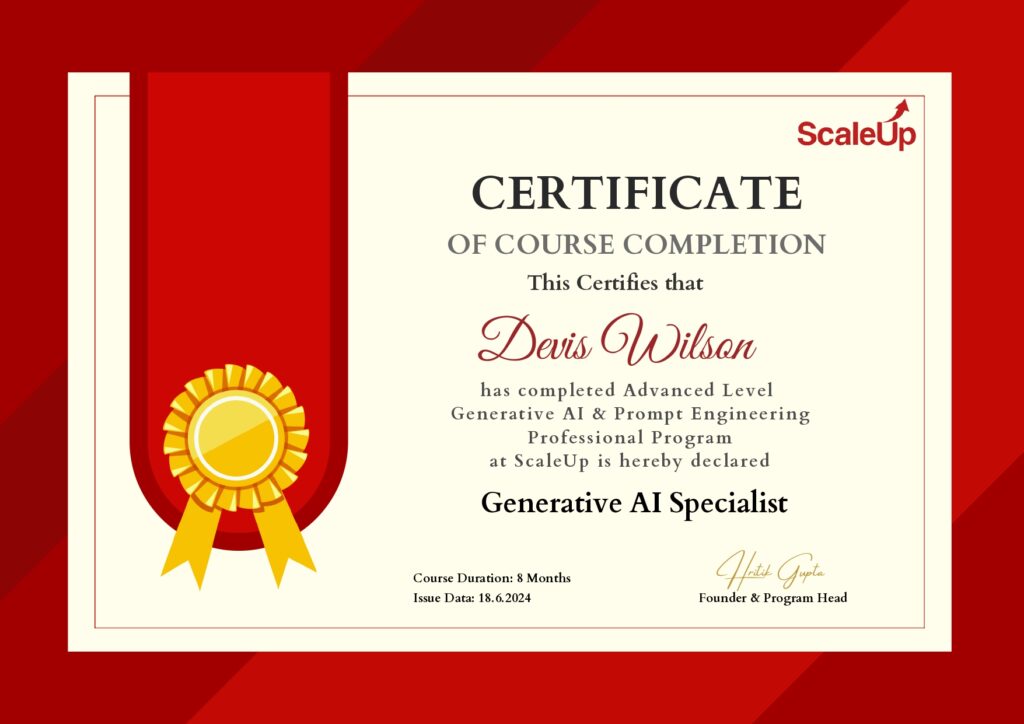
Projects
Image-to-Image Translation
Develop a model that translates images from one domain to another, such as converting satellite images to maps, enhancing low resolution images, or transforming sketches into realistic images.
Skills Needed →
Text-to-Image Synthesis
Build a model capable of generating realistic images from textual descriptions, such as generating images from captions or creating artwork from written prompts.
Skills Needed →
Music Generation
Develop a model that generates original music compositions based on input melodies, styles, or genres, enabling musicians and composers to explore new creative possibilities.
Skills Needed →
Video Frame Interpolation
Build a model that generates intermediate frames between existing video frames, allowing for smoother motion in videos and enhancing the quality of slow-motion or fast-motion effects.
Skills Needed →
Character Animation
Develop a model capable of animating characters based on textual descriptions or audio inputs, enabling real-time generation of animated content for games, movies, or virtual assistants.
Skills Needed →
Speech Synthesis
Build a model that generates human-like speech from text inputs, enabling the creation of virtual assistants, voice-overs, or personalized audiobooks.
Skills Needed →
Story Generation
Develop a model that generates original music compositions based on input melodies, styles, or genres, enabling musicians and composers to explore new creative possibilities.
Skills Needed →
Medical Image Synthesis
Create a model that generates medical images, like MRI scans or X rays, for training and testing machine learning models in healthcare applications, while preserving patient privacy and data confidentiality.
Skills Needed →
Let’s talk about your goals.
Book a free call with one of our experts.
Frequently Asked Questions (FAQ)
ScaleUp offers skill-focused programs in Data Science, AI, Cybersecurity, Business Analytics, and more — all built to help you grow in today’s digital-first world.
Yes. Whether you’re just starting out or switching careers, our courses are designed to guide you step by step — no prior experience needed.
Definitely. Every program includes practical projects, case studies, and challenges that help you apply your skills in real-life scenarios.
You’ll learn from seasoned industry professionals — people who’ve worked in top companies and bring real-world experience into every session.
Yes, we do. You’ll get help with resume building, job hunting strategies, interview prep, and even referrals through our career support team.
Of course. You’ll retain access to all your learning materials, so you can revisit lessons or refresh your knowledge anytime you need.
Yes. You’ll earn an industry-recognized certificate from ScaleUp.
Yes. You can learn at your own pace, with access to both live sessions and recorded content — designed to fit around your schedule.
You’ll have access to mentors, doubt-solving sessions, discussion forums, and personal learning assistants to help you stay on track.
Absolutely. You’ll join a vibrant group of peers, mentors, and alumni — a space to ask questions, share progress, and grow together.
